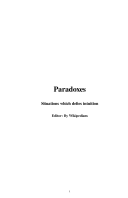Demographic-economic paradox
The demographic-economic paradox is the inverse correlation found between wealth and fertility within and between nations. The higher the degree of education and GDP per capita of a human population, subpopulation or social stratum, the fewer children are born in any industrialized country. In a 1974 UN population conference in Bucharest, Karan Singh, a former minister of population in India, illustrated this trend by stating "Development is the best contraceptive."[1]
The term "paradox" comes from the notion that greater means would necessitate the production of more offspring as suggested by the influential Thomas Malthus.[2] Roughly speaking, nations or subpopulations with higher GDP per capita are observed to have fewer children, even though a richer population can support more children. Malthus held that in order to prevent widespread suffering, from famine for example, what he called "moral restraint" (which included abstinence) was required. The demographic-economic paradox suggests that reproductive restraint arises naturally as a consequence of economic progress.
Notes:
As societies grow more developed, birthrates decrease, despite the increased resources.
Folksonomies: reproduction development paradox fertility
Taxonomies:
/health and fitness/disease/infertility (0.348092)
/society/unrest and war (0.305749)
/society (0.257965)
Keywords:
demographic-economic paradox (0.950741 (positive:0.085033)), fewer children (0.788798 (negative:-0.404533)), influential Thomas Malthus. (0.738217 (neutral:0.000000)), human population (0.641255 (positive:0.227473)), richer population (0.635796 (positive:0.522843)), higher GDP (0.635012 (neutral:0.000000)), population conference (0.634693 (neutral:0.000000)), inverse correlation (0.627011 (negative:-0.389570)), social stratum (0.620997 (neutral:0.000000)), Karan Singh (0.620447 (neutral:0.000000)), reproductive restraint (0.614174 (positive:0.563541)), moral restraint (0.609615 (positive:0.468643)), widespread suffering (0.588150 (negative:-0.599713)), best contraceptive. (0.587710 (positive:0.393479)), greater means (0.584039 (neutral:0.000000)), economic progress (0.576405 (positive:0.563541)), capita (0.538755 (positive:0.227473)), nations (0.467364 (negative:-0.389570)), consequence (0.446092 (positive:0.563541)), Bucharest (0.445281 (neutral:0.000000)), notion (0.444295 (neutral:0.000000)), famine (0.443384 (negative:-0.450259)), abstinence (0.442194 (neutral:0.000000)), wealth (0.439465 (negative:-0.389570)), offspring (0.439455 (neutral:0.000000)), fertility (0.439254 (negative:-0.389570)), trend (0.439103 (neutral:0.000000)), societies (0.438718 (negative:-0.567446)), birthrates (0.438164 (negative:-0.570972)), resources (0.438035 (negative:-0.496889))
Entities:
per capita:FieldTerminology (0.852639 (positive:0.227473)), Malthus:Person (0.518470 (negative:-0.599713)), Karan Singh:Person (0.507457 (neutral:0.000000)), UN:Organization (0.441888 (neutral:0.000000)), Bucharest:City (0.421406 (neutral:0.000000)), Thomas Malthus.:Person (0.355670 (neutral:0.000000)), India:Country (0.348089 (positive:0.284871))
Concepts:
Population (0.969449): website | dbpedia | freebase | opencyc
Demography (0.752153): dbpedia | freebase | opencyc
World population (0.718219): website | dbpedia | freebase
Birth rate (0.694226): dbpedia | freebase
2006 albums (0.656575): dbpedia
Sociology (0.655841): dbpedia | freebase | opencyc
National accounts (0.653110): dbpedia | freebase
Economics (0.638181): dbpedia | freebase | opencyc





